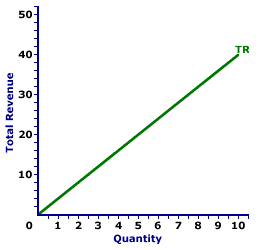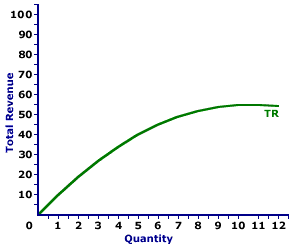
|
|
LOANS: In general, transactions in which legal claims are exchanged for money. The legal claim is typically a contract or promissory note stipulating when and how the money will be repaid. The lender gives up the money and receives the legal claim. The borrower gives up the legal claim and receives the money. A loan can be either an asset or a liability, depending on who does the borrowing and who does the lending. To the borrower, a loan is a liability, something that is owed. The borrower must pay off the loan or repurchase the legal claim. However, to the lender, a loan is an asset, something that is owned. In fact, loans represent a significant part of a bank's assets.
Visit the GLOSS*arama
|
|


|

|
                           TOTAL REVENUE CURVE: A curve that graphically represents the relation between the total revenue received by a firm for selling its output and the quantity of output sold. It is combined with a firm's total cost curve to determine economic profit and the profit maximizing level of production. The slope of the total revenue curve is marginal revenue. The total revenue curve for a firm with no market control is a straight line. The total revenue curve for a firm with market control is "hump-shaped." A total revenue curve is the relation between the total revenue a firm receives from production and the quantity of output produced. The total revenue curve reflects the degree of market control held by a firm. For a perfectly competitive firm with no market control, the total revenue curve is a straight, positively-sloped line. For firms with more market control, especially monopoly, the total revenue curve is "hump-shaped," increasing, reaching a peak, then declining.Perfect CompetitionPerfect competition is a market structure with a large number of small firms, each selling identical goods. Perfectly competitive firms have perfect knowledge and perfect mobility into and out of the market. These conditions mean perfectly competitive firms are price takers. They have no market control and receive the going market price for all output sold.Total Revenue Curve,
Zucchini Style |  |
A perfectly competitive total revenue curve is displayed in the exhibit to the right. This particular total revenue curve is that for zucchini sales by Phil the zucchini grower. The vertical axis measures total revenue and the horizontal axis measures the quantity of output (pounds of zucchinis). Although quantity on this particular graph stops at 10 pounds of zucchinis, the nature of perfect competition indicates it could go higher. This curve indicates that if Phil sells 1 pound of zucchinis, then he receives $4 of total revenue. Alternatively, if he sells 10 pounds, then he receives $40 of total revenue. Should he sell 100 pounds, then he would move well beyond the graph, with $400 of total revenue. The "curve" is actually a "straight line" because Phil is a price taker in the zucchini market. He receives $4 for each pound of zucchinis sold whether he sells 1 pound or 10 pounds. The constant price is what makes Phil's total revenue curve a straight line. Monopoly, Oligopoly, and Monopolistic CompetitionThe total revenue curve of a firm with market control is a little different that than for perfect competition. The total revenue curve for monopoly illustrates the difference. Monopoly is a market structure with a single firm selling a unique good. As the only firm in the market, monopoly is a price maker and has extensive market control, facing a negatively-sloped demand curve. If a monopoly wants to sell a larger quantity, then it must lower the price.Total Revenue Curve,
Medicine Style |  |
The total revenue curve for Feet-First Pharmaceutical is displayed in the exhibit to the right. Key to this curve is that Feet-First Pharmaceutical is a monopoly provider of a drug called Amblathan-Plus and thus faces a negatively-sloped demand curve. Larger quantities of output are only possible with lower prices.The vertical axis measures total revenue and the horizontal axis measures the quantity of output (ounces of medicine). Although quantity on this particular graph stops at 12 ounces of medicine, it could go higher. This curve indicates that if Feet-First Pharmaceutical sells 1 ounce of medicine (at $10 per ounce), then it receives $10 of total revenue. Alternatively, if it sells 10 ounces (at $5.50 per ounce), then it receives $55 of total revenue. Should it sell 12 ounces (at $4.50 per ounce), then it receives only $54 of total revenue. For Feet-First Pharmaceutical the total revenue "curve" actually is a "curve." The slope of this curve falls as more output is produced, eventually reaching a peak, then becoming negative. The changing slope of this curve is due to the changing price. Although this total revenue curve is based on the production activity of Feet-First Pharmaceutical, a well-known monopoly firm, it can also apply to any firm with market control. Monopolistic competition and oligopoly firms that face negatively-sloped demand curves generate comparable total revenue curve.

Recommended Citation:TOTAL REVENUE CURVE, AmosWEB Encyclonomic WEB*pedia, http://www.AmosWEB.com, AmosWEB LLC, 2000-2025. [Accessed: July 18, 2025].
Check Out These Related Terms... | | | | | | | | | | |
Or For A Little Background... | | | | | | | | | | | | | | | |
And For Further Study... | | | | | | | | | |
Related Websites (Will Open in New Window)... | | | |
Search Again?
Back to the WEB*pedia
|



|

|
ORANGE REBELOON
[What's This?]
Today, you are likely to spend a great deal of time wandering around the downtown area trying to buy either shoe laces for your snow boots or a rim for your spare tire. Be on the lookout for the happiest person in the room.
Your Complete Scope
This isn't me! What am I?
|

|
|
Lewis Carroll, the author of Alice in Wonderland, was the pseudonym of Charles Dodgson, an accomplished mathematician and economist.
|

|
|
"A winner is someone who recognizes his God-given talents, works his tail off to develop them into skills, and uses those skills to accomplish his goals. " -- Larry Bird, basketball player
|

|
NBV
Net Book Value
|

|
|
Tell us what you think about AmosWEB. Like what you see? Have suggestions for improvements? Let us know. Click the User Feedback link.
User Feedback
|


|


